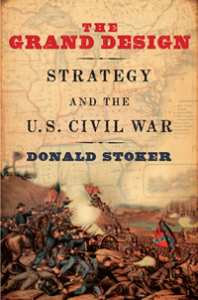Donald Stoker on “Grand Strategy in the Civil War”
There are more than 60,000 books on the Civil War. None provide a full discussion of the conflict’s strategy—except Donald Stoker’s Grand Strategy in the Civil War. Stoker, of the U.S. Naval War College’s NPS program, reveals, in the words of the presidents, generals, and admirals, the grand, strategic sweep of the war. The much maligned George McClellan had a vision of Union strategy stretching far beyond his ill-fated Peninsula campaign, one that could have produced Union victory in 1862. The clearest picture yet of Lincoln’s evolution as a strategic thinker also emerges, one in which his clarity and decisiveness in political thought and control shines through just as brightly as his strategic failures. Lincoln had many good strategic ideas, but too often he failed to insure that his subordinates carried them out. One of these, Henry Halleck, McClellan’s successor, cost the Union many lives, and was one of the reasons Union victory was so long delayed. Grant and Sherman emerge as decisive operational and strategic thinkers. Sherman, in many respects, was the best of all. The Confederates had their own problems, not the least of these was their president, Jefferson Davis, a man whose jealously of his prerogatives often sabotaged the Confederate war effort. Often credited with great strategic vision; he had none. He never developed a strategic vision for winning the war, and never asked any of his generals to do so either. The much-reviled Braxton Bragg offered one of the best of the Confederacy’s strategic plans, which his superiors partially followed. Other top Confederates, such as Joseph Johnston, proved just a prickly as their civilian superior, and wasted their energies in ego-feeding duels. Johnston also consistently failed to carry out the orders of his superiors, or to exercise the initiative given him. Robert E Lee, the best of the Confederate generals, and one of the few to hatch a strategic thought, divined the solution to Confederate victory, but chose the wrong path for getting there.

